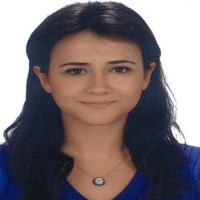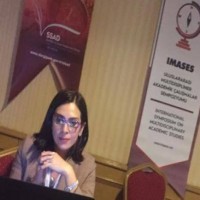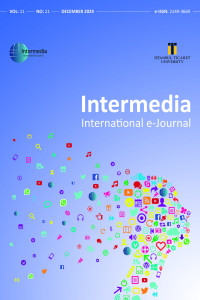Articles
Issue Reviewers





 0000-0002-1494-2176
0000-0002-1494-2176

 0000-0003-0683-9790
0000-0003-0683-9790






 0000-0002-6138-6758
0000-0002-6138-6758

Aim & Scope
E-Journal of Intermedia started its publication within and under the tutelage of Istanbul Commerce University in 2014. Intermedia as an international e-journal is aimed to be published twice per year in June and December via internet.
Aim
E-Journal of Intermedia started its publication under patronship of Istanbul Commerce University, Faculty of Communication and Media and Communication Systems Departement in 2014. Intermedia as an international e-journal is aimed to be published bi annually i.e. in June and December online.
Intermedia International eJournal is a Peer-Reviewed E-Journal of Communication Sciences which is international indexed e-journal seeking to create a link between academicians from diverse disciplines working on communication field and academicians who already work in the broaders area of communication discipline.
The advisory board of our journal is formed of reviewers of academicians from different universities around the world. Articles which will have succcessfull doulbe blind review will be published in the journal.
Scope
Intermedia International E-Journal is an open access international peer-reviewed e-journal that aims to create a link between academics from different disciplines working in the communication field and practiners currently working in the communication discipline.
Author Guidelines
Guidelines for Authors
Unless noted otherwise, correspondence about the study is carried out on the profile in which the article was uploaded to Dergipark. Before the article is uploaded, all proof reading and editing must be carefully checked and submitted to the journal completely through the Dergipark Onliner System.
Authors must be aware that if they do not complete the requested changes for their work within 15 days at the pre-check stage and upload them to the system, the work will be refused before proceeding to the reviweing and editing phase.
No information about the authors such as name, title, institution, e-mail address, orcid, can be given in the paper. There is no need to give details in the papers of project number, supporting institution and project name; the contribution of the authors and the acknowledgments of supporting persons/instituttions must be ommitted at the frist stage of blind review. Any declaration of conflict of interest, names of people or institutions for thanking should not be included in the “Full Text” file in which the article is written. Only ethics committee name, decision number and date information should be included in the introduction of the method. This information should be included in the file titled “Title Page.” Upload “Article Information” Word document to the DergiPark system as an additional file by clicking the “Upload an attachment” button.
• The language of the journal is Turkish and English.
• The title of the article should be appropriate and represetnative to the content of the paper. The study must be submitted in MS Word format.
• For the articles, Turkish - English / English-Turkish title, abstract, keywords, extended abstract (must be between 750-1000 words in English). The main text must include an introduction, method, findings, discussion and conclusion, references, and appendices. Studies can not exceed 8,000 words including abstract and bibliography.
• On the first page, the title must be in the center and written in capital letters and 14 pt. Calibri. Under the main title, the title in another language (Turkish / English) must be written in Calibri with 12 pt.
• The type of article must be written in Calibri with 9 pt, leaving a footnote in the title.
• Keywords must be written in Calibri with 9 pt., capitalized first letters and 1.25 cm indented, in italics under the abstract of 150-250 words. Minimum of three and a maximum of five keywords are required. The purpose, method, and result must be briefly covered in the abstract.
• If the expanded English abstract consists of more than one paragraph, the first paragraph can not have a line input. The first line entry of the next paragraphs should start at 1.25 cm inside.
• There is no need for an extended English Abstract for studies prepared in English. An abstract between 150-250 words, written in two languages in English and Turkish, must be added to the article.
• After the title, abstract and keywords are all written, the article must start with "Introduction." INTRODUCTION title must be written in bold. All parts of the text, except graphics and tables, must be aligned and written in 10 pt. and 1 cm spacing from the paragraph indent.
• The text must be written in A4 format, paragraph field should be 0 pt, 1.1 line spacing, and 10 pt. Calibri. If necessary, footnotes can be written in 9 points. One line space must be left after each paragraph. The page layout must be aligned at 3.5 cm from the top and bottom and 2.5 cm from the left and right.
• Direct quotations must be given in quotation marks; Quotations shorter than five lines must be placed in the text, long quotations must be placed in blocks, with 1 line spacing and indented left and right in the text.
• The section title and subtitle should be left-aligned. Chapter headings 1, 2, 3, etc., must be numbered such. Formulas and equations must be numbered from the beginning of the work and numbering must be right-aligned in parentheses. Tables, charts, and figures must be numbered from beginning to end (Table 1, Chart 1, etc.) After the colon, the first letter must be capital as well as the text must be bold. Titles of tables, graphs, and figures should be at the top and in the middle. If tables, graphs, or figures are quoted, the source should be specified in 9 points at the bottom right. Tables can not be colored. Footnotes and references must comply with the rules written on the journal's website.
• There is no space between the title and the first paragraph. The first paragraph after the title must not be "first-line entry." In the next paragraphs, the first-line input must be set at 1.25 cm.
• Page numbering is not allowed.
• References and quotations must be appropriate for APA 6.0 Edition.
• In-text citation must be stated as follows: (Aktaş, 2017, p.50), (Biolcati & Passini, 2018, p.34), (Bolter, MacIntyre, Gandy, & Schweitzer, 2006, p.34). The bibliography should start on a new page.
The word "BİBLİOGRAPHY" must be written in bold and capital letters. The line spacing in the sources should be set as 0 pt. first, then 8 pt. Sources that are not cited in the text can not be given in the bibliography. Any information about the cited studies can not be missing. Appendices related to the study (if any) must start on a new page after the bibliography.
The Plagiarism Report must be uploaded to the system at the application stage while sending the article to the journal. For the beginning of the evaluation process, the similarity rate can be at most 15% in the plagiarism report received by iThenticate, Turnitin, or another program. When necessary, the journal board can check the article for plagiarism. Studies that do not meet the relevant criteria can be "returned to the author for correction" or "returned to the author." Works returned for correction must be uploaded in the system within 15 days after removing the plagiarism.
Ethical Principles and Publication Policy
The guide must be reviewed carefully by all researchers who will submit a study to the journal. The sources used in preparing these policies are stated at the end of the guide.
PUBLICATION POLICY
Intermedia International e-Journal is committed to abide by the highest standards of publication ethics. It adopts the ethical publishing principles of the Committee on Publication Ethics (COPE), the Directory of Open Access Journals (DOAJ), Open Access Scholarly Publishers Association (OASPA) and the World Association of Medical Editors (WAME). For the principles expressed under the heading of “Principles of Transparency and Best Practice in Scholarly Publishing”, please visit the link below:
https://publicationethics.org/resources/guidelines-new/principles-transparency-and-best-practice-scholarly-publishing
All parties involved in the publishing process (Editors, Reviewers, Authors and Publishers) are expected to agree on the following ethical principles.
All submissions must be compatible with the aim and scope of the journal. Only the manuscripts that are original, not published (including as full text in conference proceedings), and not under review of any other publication simultaneously are accepted for evaluation. The manuscripts must also be approved by each author in terms of its content and submission.
The name of any author cannot be deleted from the manuscript without the permission of all authors. A new author name cannot be included in the manuscript, and author order cannot be changed without the permission of all authors.
Plagiarism, duplication, use of artificial intelligence, fraud authorship/denied authorship, research/data fabrication, salami slicing/salami publication, breaching of copyrights, prevailing conflict of interest are accepted as unethical behaviors. All manuscripts that do not comply with the accepted ethical standards are removed from the publication. If a manuscript with illegal and/or unethical features is realized after its publication, it is also removed from the publication.
OPEN ACCESS POLICY
Intermedia International E-journal, which is an open access journal aware of the need for free and easy access to information to advance scientific studies, supports the initiative of open access to peer-reviewed journal literature included in the Budapest Open Access Declaration. Intermedia International E-journal presents all published articles free of charge in an environment that everyone can read and download. In this declaration, open access means that "scientific literature can be accessed, read, recorded, copied, printed, scanned, linked to full text, indexed, transferred to the software as data and used for any legal purpose via the Internet without financial, legal and technical barriers."
Thinking of the role of knowledge sharing in the advancement of science, open access has remarkable importance for researchers and readers. Therefore, the articles in this journal can freely be used if the author and source are cited. No permission is required from the authors or publishers. Articles in the journal are available across search engines, websites, blogs, and other digital platforms. These open-access policies, adopted on September 12, 2012, and adopted by the editorial board, can be accessed through http://www.budapestopenaccessinitiative.org/boai-10-translations/turkish-translation. Istanbul Commerce University, the publisher of the journal, does not charge any subscription fee, publication fee, or similar payment for access to electronic resources.
Creative Commons
A Creative Commons license is a form of public copyright license that allows a copyrighted work or work to be distributed free of charge. When an author wishes to give the right to share or modify the work they have created for use, they use the CC license.
Our journal deems the "Creative Commons Attribution License (Attribution-NonCommercial-NoDerivatives 4.0 International CC BY-NC-ND)" for all published articles.
This license allows another author to use the work in the other author's works, provided that it is for non-commercial purposes and refers to the work published/to be published in our journal. Open access is an approach that reinforces interdisciplinary development and encourages collaboration between different disciplines. Therefore, JOURNAL contributes to its field by providing free access to its articles and a more transparent review process.
Share: Copy and redistribute the material in any medium or format. The licensor cannot revoke these freedoms as long as you follow the license terms.
Attribution: You must give appropriate credit, provide a link to the license, and indicate if changes were made. You may do so in any reasonable manner, but not in any way that suggests the licensor endorses you or your use.
NonCommercial: You may not use the material for commercial purposes.
NoDerivatives: If you remix, transform, or build upon the material, you may not distribute the modified material.
No additional restrictions: You may not apply legal terms or technological measures that legally restrict others from doing anything the license permits.
ETHICS POLICY
It is aimed that all stakeholders (author, editor, referee, publisher, and the reader), who produce a scientific study, contribute to the advancement of science. Compliance with scientific ethical principles is crucial in scientific studies prepared in line with this goal.
These ethical principles are prepared keeping in view the instruction prepared by COPE (Committee on Publication Ethics). We accepted these ethical principles. Adaptation of them by stakeholders is recommended. Some of them are listed below.
In articles produced from graduate theses, the thesis owner is the first author. If the thesis advisor has contributed to the article, he/she can be listed as an author in a ranking other than the first author. In the Author Contribution Rate declaration, the contribution rate of the advisor cannot be more than the contribution rate of the thesis owner.
Research Ethics
The journal adheres to the highest standards in research ethics and follows the principles of international research ethics as defined below. The authors are responsible for the compliance of the manuscripts with the ethical rules.
- Principles of integrity, quality and transparency should be sustained in designing the research, reviewing the design and conducting the research.
- The research team and participants should be fully informed about the aim, methods, possible uses and requirements of the research and risks of participation in research.
- The confidentiality of the information provided by the research participants and the confidentiality of the respondents should be ensured. The research should be designed to protect the autonomy and dignity of the participants.
- Research participants should participate in the research voluntarily, not under any coercion.
- Any possible harm to participants must be avoided. The research should be planned in such a way that the participants are not at risk.
- The independence of research must be clear; and any conflict of interest or must be disclosed.
- In experimental studies with human subjects, written informed consent of the participants who decide to participate in the research must be obtained. In the case of children and those under wardship or with confirmed insanity, legal custodian’s assent must be obtained.
- If the study is to be carried out in any institution or organization, approval must be obtained from this institution or organization.
- In studies with human subject, it must be noted in the method’s section of the manuscript that the informed consent of the participants and ethics committee approval from the institution where the study has been conducted have been obtained.
Ethical Responsibilities of Authors
It is authors’ responsibility to ensure that the article is in accordance with scientific and ethical standards and rules. And authors must ensure that submitted work is original. They must certify that the manuscript has not previously been published elsewhere or is not currently being considered for publication elsewhere, in any language. Applicable copyright laws and conventions must be followed.
Author's Ethics Responsibilities:
To be sure of the accuracy of the data related to the study, to keep the records of the research in order, and to be able to give access to data upon possible request.
Make sure that the article you submit has not been submitted for publication, published or accepted for publication elsewhere.
Ensure that all work involving human or animal subjects comply with national and international laws and guidelines (for example, WMA Declaration of Helsinki, NIH Policy on the Use of Laboratory Animals, EU Directive on the Use of Animals). Confirm that the necessary approvals had been gotten and show respect for subject privacy.
To indicate relevant ethical committee approvals and research details in the "Materials and Methods" section of the study.
In the event of any conflict of interest or detection of ethical violation, share with the editor and publisher, stating error, addendum, indemnity statement, or withdrawing the work when necessary before the publication.
"Ethics Committee Approval" must be received for the articles submitted to the journal since 2021, and this approval must be stated and documented in it.
Studies requiring Ethics Committee Permission;
- Any kind of research requires data collection from participants with qualitative or quantitative approaches (questionnaire, interview, focus group study, observation, experiment, interview techniques, etc.)
- Clinical trials on humans and/or animals
- Retrospective studies following the Law on Protection of Personal Data and Protection of Personal Privacy.
* Information regarding the permission of the ethics committee (board name, date, and contact details) must be presented in the "Supplementary File" prepared as "Author Information."
* In phenomenon presentations, the information that the informed consent form was signed must be given in the article.
Retrospective ethics committee approval is not required for articles that have used research data before 2020, produced from master's / doctoral studies (should be stated in the article), submitted a publication application to the journal before 2020, accepted but not yet published.
Editors' Ethical Duties and Responsibilities
Double anonymous peer review process is carried out in the evaluation of the articles. Referees are selected from different institutions, taking into account the institutions to which the authors are affiliated. Two referees from the same institution are not assigned for an article. The referees assigned to an article are not informed about the author and other referees. The decision of each referee is kept confidential until the process of the article is completed. If one of the referees rejects an article, a third referee is assigned. All refereeing processes are carried out as double anonymous peer review.
Acting in a balanced, objective, and fair manner in carrying out their duties without discrimination on gender, religious or political beliefs, authors' ethnic or geographical origin.
To evaluate the articles submitted to the journal according to their content, not to show any privileges to any author.
To take necessary measures to prevent potential conflicts of interest and to evaluate existing statements, if any.
To treat sponsored studies or studies on special topics in the same way as other studies,
In case of a complaint of ethical violation, follow the necessary procedures by adhering to the policies and procedures of the journal. To allow the authors to respond to the complaint and not to avoid applying the necessary sanctions regardless of who the work belongs to.
To reject the incoming work if it is not suitable for the journal's purpose and scope.
Ethical Responsibilities of Referees
To review the article objectively on time to contribute to the editor's decision-making process and to agree to evaluate only the studies related to the area of expertise.
To make the evaluation objectively only about the content of the study. To evaluate working without considering religious, political, and economic interests.
To provide guidance that will help to increase the quality of the article to be published and to examine the work meticulously. To convey editorial comments to the author in constructive and courteous language.
To protect the confidentiality of the information provided by the editor and the author, to destroy the study after the evaluation process due to the principle of confidentiality, to notify the editor if there is a situation against blind refereeing and not to evaluate the work.
To be aware of potential conflicts of interest (financial, institutional, collaborative, or other relationships between author and editor) and, if necessary, to alert the editor to withdraw their assistance for this article.
Publisher's Ethical Responsibilities
Among the stakeholders involved in a scientific study, the publisher must act within the scope of all these ethical principles.
The publisher is obliged to use its communication power without any individual benefit and to direct its target audience correctly.
It protects the open access policies of every published work and undertakes the duty of archiving every published product.
People should not hesitate to contact the publisher when faced with an unethical situation.
Some of the actions considered to be against scientific research and publication ethics:
• Plagiarism: producing others' original ideas, methods, data, or works as their work, partially or completely, without referring to scientific rules of intext citations.
• Forgery: Using data that does not exist or has been falsified in scientific research.
• Distortion: Falsifying the research records or data obtained, showing the devices or materials not used in the research as being used, falsifying or shaping the results of the research in line with the interests of the people and organizations,
• Republishing: To present repetitive publications as separate publications for academic appointments and promotions,
• Slicing: To present these publications as separate publications in academic appointments and promotions by breaking the results of research into pieces in a way that disrupts the integrity of the research and inappropriately and publishing in more than one issue,
• Unfair authorship: Including people who have no active contribution among the authors or not including those who are, changing the author's order in an unjustified and inappropriate manner, removing the names of those who have an active contribution from the work in subsequent editions, including their names among the authors by using their influence even though they have no active contribution,
• Not specifying the supporting persons, institutions, or organizations and their contributions in the publications made as a result of researches conducted with support,
• Using thesis or studies that have not been submitted yet or have not been accepted as a source without the permission of the owner,
• Failing to comply with ethical rules in research conducted on humans and animals, not respecting patients' rights in their publications, harming animal health and ecological balance, not obtaining necessary permissions,
• Misusing resources, spaces, facilities, and devices provided or allocated for scientific research,
• Making false or misleading statements regarding scientific research and publications in academic appointments and promotions.
Plagiarism Policy
Authors are expected to upload a plagiarism report during the application phase. Pre-controlled manuscripts are re-scanned for plagiarism via using iThenticate software. If plagiarism/self-plagiarism is detected, the authors are informed. If necessary, editors might check the manuscript for plagiarism at various stages of the evaluation or production process. High similarity percentages might cause a manuscript to be rejected before or even after it is accepted.
For a manuscript to be published the similarity percentage must be less than 15% depending on the category of the manuscript.
While the articles are submitted to the journal, the Plagiarism Report must be uploaded to the system at the application stage. To initiate the evaluation process of the article, the similarity rate can be at most 15% in the plagiarism report received by iThenticate, Turnitin, or another program. When necessary, journal management can check the article for plagiarism. An article that does not meet the relevant criteria can be "returned to the author for correction" or "returned to the author."
Articles returned for correction must be uploaded to the system within 15 days after correction.
When getting a similarity report, the filtering options must comply with the following criteria.
-Except for Bibliography (Bibliography excluded)
-Excluding quotes (Quotes excluded)
-Except for parts of a text containing less than five words overlap (Limit match size to five words)
- Other filtering options available in the program menu are not included in the reporting.
- The report should be saved as a ".pdf" extension.
Conflict of Interest
Situations that provide economic or personal benefits create a conflict of interest. Reliability of scientific process and published articles; is directly related to objectively handling conflicts of interest during the planning, implementation, writing, evaluation, editing, and publication of the scientific study. Financial relationships are the most easily identifiable conflicts of interest, and it is inevitable to damage the credibility of the journal, authors, and science. These conflicts can be produced by individual relationships, academic competition, or intellectual approaches. Authors are responsible for restricting access to all data or analyzing, interpreting, preparing articles, publishing, etc. As far as possible, authors should avoid entering into agreements with sponsors, both for-profit and nonprofit, that interfere with their abilities. To prevent conflicts of interest, editors should also avoid bringing together people who may have any relationship during the evaluation of the study. Editors who make the final decision about the articles should also have no personal, professional, or financial ties with any of the topics they will decide for publication. Individuals should inform the editorial board of possible conflicts of interest so that articles can be evaluated within the framework of ethical principles, and an independent process must be conducted. Our editorial board works devotedly to ensure that the evaluation process is directed impartially, considering all these situations.
In articles produced from graduate theses, the names of the advisor, monitoring and/or completed committee who took part in the thesis must be declared.
Resources utilized in the process of preparing and adopting of the above data/policies:
Budapest Open Access Statement
ICMJE (International Committee Of Medical Journal Editors)
Creative Commons COPE (Committee on Publication Ethics)
Education and Science Journal Publication Policies
DOAJ Principles Of Transparency And Best Practice In Scholarly Publishing, Version 3
YÖK Scientific Research and Publication Ethics Directive
Price Policy
No fee is requested from the author(s) for publication of their articles.
The readers can download the Journal content for free for academic or educational use. The Journal is free for everyone.
 Intermedia International E-journal
Intermedia International E-journal
Bu eser Creative Commons Alıntı-GayriTicari-Türetilemez 4.0 Uluslararası Lisansı ile lisanslanmıştır.

